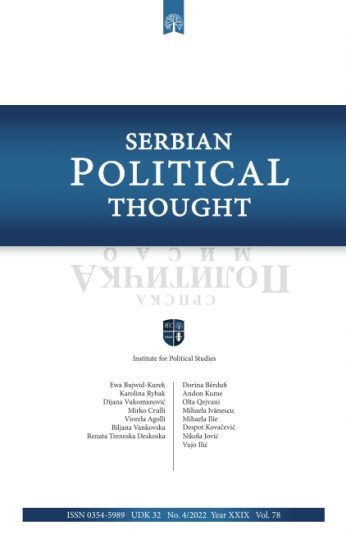Main topic
Serbian Political Thought
Sanctions as an Ambiguous Tool of Economic Statecraft: The Case of Russia Post-2014
Abstract
Trade and financial sanctions are regularly considered one of the most widely employed tools of economic statecraft, although their efficiency is occasionally disputed. In academic literature and political practice alike, it is often claimed that they can effectively be used to influence a particular state’s behavior and shape international political outcomes. Even the potential for sanctions to be imposed is sometimes enough to produce the wanted consequences. Some conditions are previously required, though, in order for sanctions to work. They pertain to the level of balance between the actors’ capabilities and vested interests. In the case of sanctions imposed to Russian Federation by a large number of Western countries, the conditions have clearly not been met. Given that the purpose of sanctions imposed is not to affect the targeted state’s economy, but to influence its behavior, it may well be stated that the tool has not been successfully used. Also, within the current, ever-larger global interdependence, the consequences produced by international sanctions have backfired and hampered the economies of many of the European Union member states, thus creating blocks of opposition within the Western club and demonstrating the ambiguity of the tool itself. It all goes to show that the way of handling the Ukraine crisis, regarding its reliance on international sanctions, was flawed. As such, it is not only significant as a roadmap of how not to handle international conflicts, but as a potentially valuable case study in the future economic statecraft textbooks
References
- Aalto, Pami & Tuomas Forsberg (2016) “The Structuration of Russia’s Geo-economy under Economic Snctions”, Asia Europe Journal, 14(2): pp. 221-237.
- Baldwin, David A. (1985) Economic Statecraft. Princeton [NJ]: Princeton University Press.
- Bershidsky, Leonid (2016) “The U.S. Sanctions Russia, Europe Says ‘Ouch!’”, Bloomberg, 16/06/2017, https://www.bloomberg.com/view/articles/2017-06-16/u-s-russia-sanctions-punish-europe-too, accessed 30/08/2017.
- Chebankova, Elena (2017) “Russia’s idea of the multipolar world order: ideas and main dimensions”, Post-Soviet Affairs, 33(3): pp. 217-234.
- de Galbert, Simond (2016) Transatlantic Economic Statecraft: The Challenge to Building a Balanced Transatlantic Sanctions Policy between the United States and the European Union. Washington, D. C.: Center for Strategic & International Studies – Center for a New American Security.
- Dresen, P. Joseph (2015) Sanctions Emerge as the Indispensable Tool of American Statecraft. Kennan Cable No. 9. Washington, D. C.: Woodrow Wilson International Center for Scholars.
- Drezner, Daniel W. (2003) “The Hidden Hand of Economic Coercion”, International Organization, 57(3): pp. 643-659.
- Drezner, Daniel W. (2011) “Sanctions Sometimes Smart: Targeted Sanctions in Theory and Pratice”, International Studies Review, 13(1): pp. 96-108.
- Facon, Isabelle (2017) Russia’s national security strategy and military doctrine and their implications for the EU. In-depth analysis. Brussels: European Parliament – Directorate-general for External Policies, Policy Department.
- Harrell, Peter E., Tom Keatinge, Sarah Lain, and Elizabeth Rosenberg (2017) The Future of Transatlantic Sanctions on Russia. Washington, D. C.: Center for a New American Security – Royal United Services Institute for Defence and Security Studies.
- Karásek, Tomáš (2014) NATO and Russia after Crimea: From Failed Socialization to Renewed Containment. Policy Paper 1. Prague: Association for International Affairs.
- Kissinger, Henry (2014) World Order. New York [NY]: Penguin Press.
- Krasner, Stephen (2000) “State Power and the Structure of International Trade”, in: Jeffrey A. Frieden & David A. Lake (eds.): International Political Economy: Perspectives on Global Power and Wealth. London: Routledge. pp. 19-36.
- Lairson, Thomas D. & David Skidmore (2003) International Political Economy: The Struggle for Power and Wealth. Belmont [CA]: Wadsworth/Thomson Learning.
- Lišanin, Mladen (2016) „Ekonomija i politika u međunarodnoj teoriji: realistička perspektiva“ [“Economy and Politics in International Theory: Realist Perspective”], Srpska politička misao, 54(4): pp. 121-134.
- Logendran, Vidhya (2015) “How Russia Survived Sanctions, and Why Parallel Avenues for Diplomatic Engagement Are Vital”, The International Economy, Summer: pp 48-51.
- Mastanduno, Michael (1998) “Economics and Security in Statecraft and Scholarship”, International Organization, 52(4): pp. 825-854.
- Mastanduno, Michael (2016) “Economic statecraft”, in: Steve Smith, Amelia Hadfield & Tim Dunne (eds.): Foreign Policy – Theories, Actors, Cases. Oxford: Oxford University Press. pp. 222-241.
- Moret, Erica et al. (2016) The New Deterrent? International Sanctions against Russia over the Ukraine Crisis: Impacts, Costs and Further Action. Geneva: Graduate Institute of International and Development Studies.
- Neuwirth, Rostam J. & Alexandr Svetlicnii (2016) “The current EU/US–Russia conflict over Ukraine and the WTO: a preliminary note on (trade) restrictive measures”, Post-Soviet Affairs, 32(3): 237-271.
- Rosenberg, Elisabeth, Zachary K. Goldman, Daniel Drezner & Julia Solomon-Straus (2016) The New Tools of Economic Warfare: Effects and Effectiveness of Contemporary U.S. Financial Sanctions. Washington, D. C.: Center for a New American Security.
- Walt, Stephen M. (2014) “Would You Die for that Country?”, Foreign Policy, 24/03/2014, http://foreignpolicy.com/2014/03/24/would-you-die-for-that-country/, accessed 01/09/2017.
- Wohlforth, William C. (2014) “Hegemonic Decline and Hegemonic War Revisited”, in: G. John Ikenberry (ed.): Power, Order and Change in World Politics. Cambridge: Cambridge University Press. pp. 109-130.

